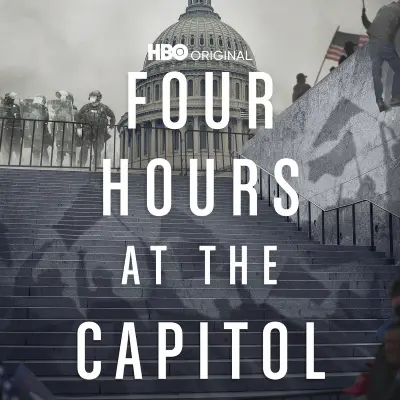HBO's powerful Four Hours at the Capitol is also flawed for its "both sides" presentation of the U.S. Capitol Takeover
-

Jamie Roberts' documentary on the Jan. 6 U.S. Capitol takeover "presents a tick-tock of the events of the day, complete with so much harrowing footage that it’s hard to watch," says Daniel D'Addario. "...The imagery of destruction and assault is powerful on its own terms; it’s in building the story of the participants’ motives and actions that Four Hours at the Capitol falters, making what could have been a definitive document into a deeply flawed one." The problem, says D'Addario, is allowing the insurrectionists and Trump's supporters to have a prominent voice in the documentary. "It’s hard to imagine the right way to treat footage like this: It is not Roberts’ responsibility, necessarily, to insert himself into the documentary and assert directly that this is inaccurate," says D'Addario. "And many viewers will understand that though what they’re seeing in the moment is not literally violent, the footage that comes later is undeniable. We see how close Congress came to facing a violent mob, Senators and Representatives donning gas masks, and the sheer manpower of the mob, constantly sending forward 'fresh people' to face down an outmanned police force. In its structure and in the pain and emotion that Roberts elicits from interview subjects, Four Hours is a real achievement. What’s most frustrating, then, is that studded throughout are denialist claims that serve no useful dramatic or informational point. We know that the events of the day are being minimized constantly, from living in the world. This documentary undercuts its genuinely startling element — the gathering and structuring of so much inside footage — with statements that are either purposefully dissembling or reflecting a deluded worldview. Both of these impulses will be intimately familiar to a viewer who watches the news; one who doesn’t might have benefited from a project that played things a little more straight, taking both sides of the story but using tactics more direct than ironic counterpoint to address the one that doesn’t have truth on its side."
ALSO:
- This was not a documentary that could be made properly at this early a date: "To use a wildly hyperbolic analogy, there’s a reason why Netflix routinely releases a dozen shows focusing on serial killers from the ’70s and ’80s, but no shows about currently active serial killers," says Daniel Fienberg. "The conceit of Four Hours at the Capitol...is that it’s an almost minute-by-minute examination of the events of Jan. 6, 2021 through the eyes of the people who were there. That means no historians or commentators, no celebrities expressing horror at what they witnessed on TV from their couches, no late-night pundits offering snarky levity. (Director Jamie) Roberts’ interview subjects break down into three categories. There are the participants in the march/insurrection, including self-described members of the Proud Boys and Cowboys for Trump, but also self-described filmmakers and more professionally described journalists who sensed a story was unfolding that day and followed it. There are the members of the Capitol police and the DC metro police, entrusted with protecting one of American democracy’s most sacred sites from vandals and marauders and protestors. And then there are the politicians who were attempting to go through what would be, most election years, one of the dullest and most perfunctory parts of the process, the roll-call certification of electors. It is the story seemingly presented from all sides, except — let’s be perfectly frank — you can’t have this story from all sides. Not now. There are hundreds of criminal cases pending and most people are not going to go on the record with an HBO documentarian about things that could get them sent to prison for years. So Roberts has succeeded in telling a story about the Jan. 6 insurrection in which nobody is willing or able to say that they did anything especially illegal — even as the film dips into a nearly bottomless reservoir of footage of alleged protestors doing completely illegal things on that day. Everybody here is a participant and nobody here is an instigator and that can’t possibly be the story."
- Four Hours at the Capitol is a rote re-assembly of footage with little insight
- By providing them with a platform, Four Hours at the Capitol allows its pro-riot voices to damn themselves
TOPICS: Four Hours at the Capitol, HBO, Jamie Roberts, Documentaries, U.S. Capitol Takeover
More Four Hours at the Capitol on Primetimer:
